The Modeling, Simulation and Data Analytics Lab is a specialized facility researching advanced computational techniques for modeling, simulation and optimizing behaviors of complex systems in engineering, health, energy and environmental sciences. Digital Twins (DTs) are realistic and dynamic representations of the physical systems with respect to predefined goals. The digital replication of real-world scenarios, provides cost-effective, risk-reducing, and time-saving solutions that support research, development, and education. Our vision is to establish modern problem-solving and technological advancement by optimizing system performance, informing decision-making, and driving innovation in both academia and industry.
Services
• Data-driven system modeling and optimization to analyze, predict, and improve their performance.
• Predictive analysis and maintenance for proactive care before breakdowns occur.
• Research and development (R&D) support to facilitate the innovation, design, and improvement of products, processes, and technologies.
• Combining expert knowledge with systems’ data (Hybrid learning)
• Data-driven reliability analysis of cyber physical systems
• Cognitive digital twins (Fusion of human cognition with dynamic data-driven modelling)
• Data visualization and data analytics to understand large data sets, discover actionable insights, and communicate findings effectively.
Research
At MSDA laboratory, we research real-world system scenarios, exploring insights that inform decision-making, improve system designs, predict outcomes, and develop innovative solutions to complex challenges. Our primary focus is modeling physical systems to study design efficiency and predict potential failure events to reduce risk in the production.
Key areas of research:
Modeling and Simulation
Involves the use of mathematical and computational models to imitate real-world processes, enabling analysis, experimentation, and decision-making in complex systems without directly interacting with the actual system.
Data-driven Simulation and Digital Twins
Cognitive Digital Twins: Digital Twins simulate physical systems, while Cognitive Digital Twins add human factors. The integration of an AI-based DT which uses streaming data and experts’ knowledge of the field provides a CDT which applies key technologies that hopefully results in: lower costs, higher productivity, better quality and sustainability.
Reliability Analysis and Predictive Maintenance
One of the significant trends in smart manufacturing is the idea of industrial digitalization, which is enabled by new information technologies, such as the Internet of Thing, big data, cloud computing, and AI. Hybrid reliability analysis helps to develop CDTs for better reliability and predictive maintenance in smart manufacturing, minimizing downtime and extending machinery lifespan. This approach supports sustainable predictive maintenance with benefits like real-time monitoring, cost savings, and optimised maintenance schedules.
Sustainable Digitalization
Performing a requirement analysis to understand what are the challenges for building a foundation towards sustainable digitalisation.
Contact
 |
Parisa Niloofar SDU Software Engineering parni@mmmi.sdu.dk +45 65503209 |
| Sanja Lazarova-Molnar SDU Software Engineering slmo@mmmi.sdu.dk +45 65509338 |
